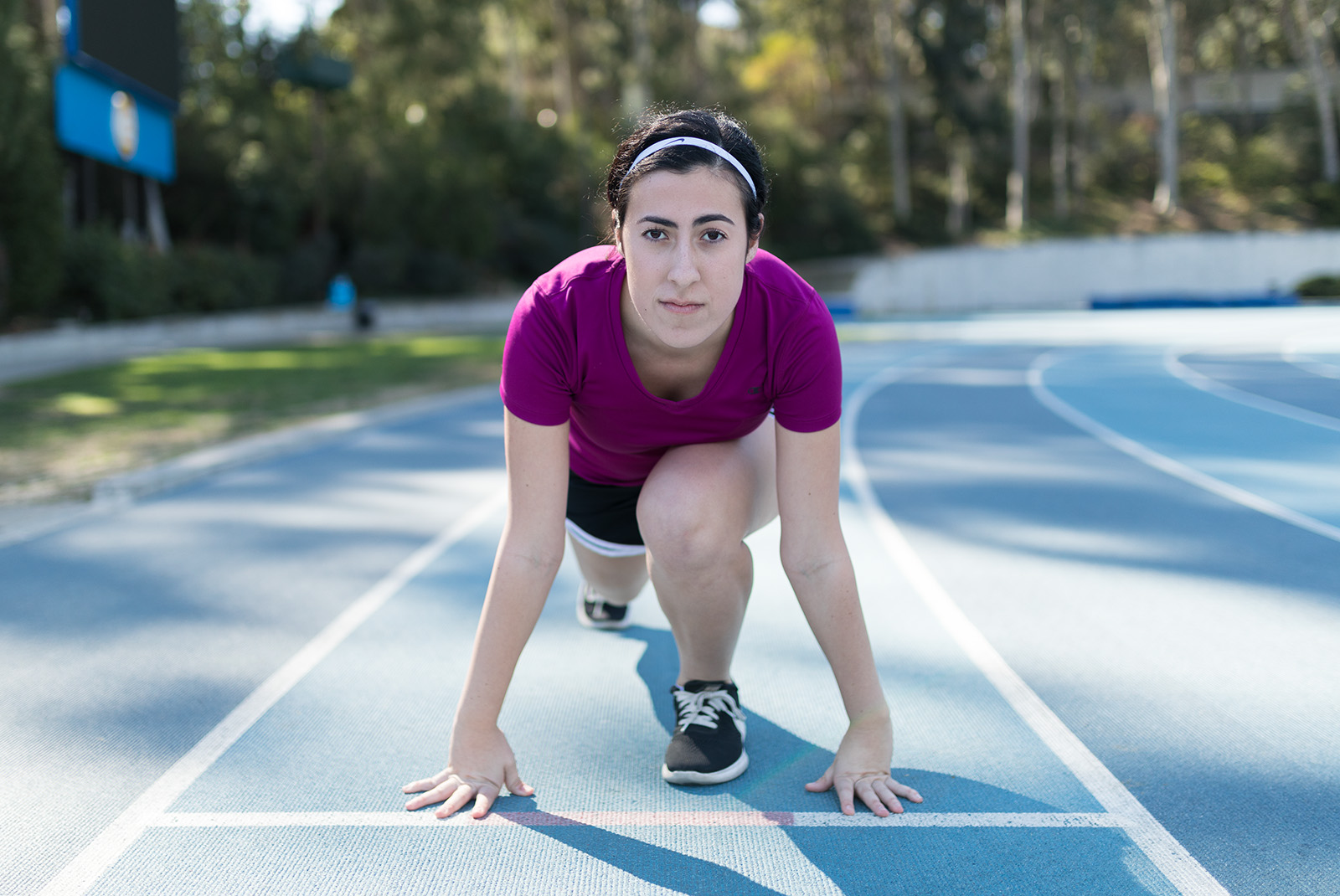Stress Less: Though not necessarily fun, running brings mental and physical benefits

Daily Bruin columnist Alissa Evans ran once a day for a week to see if it would help lower her stress levels. Evans ran approximately 20-30 minutes at Drake Stadium and the Bruin Fitness Center. (Chengcheng Zhang/Daily Bruin)
By Alissa Evans
Feb. 26, 2018 11:25 p.m.
Alissa Evans’ experience with stress stems primarily from her inability to definitively choose a major, a recently received D that taints her otherwise mediocre GPA and her complete and utter confusion regarding the abstract concept commonly referred to as her “future.” In the midst of a midcollege crisis, the Daily Bruin columnist decided to try a different stress-relieving activity every other week of winter quarter and chronicled her quest for mental homeostasis in Stress Less.
I’ve always maintained the belief that anyone who describes running as “fun” needs to seriously re-evaluate their priorities.
But the cult of superhumans who start the day by selecting which of their 25 pairs of Nike shoes to wear on their 6 a.m. run is simply too large to discount. As any runner would enthusiastically explain, physical exercise prompts the production of neurotransmitters in the brain called endorphins, which diminish the perception of pain, improve sleep and even create feelings of euphoria.
Although the mere thought of running gives me high blood pressure, the stress of week seven midterms and upcoming finals compelled me to confront my aversion to running head-on.
My admittedly negative feelings toward running originate from eight long years of competitive soccer – my coach’s gruff voice shouting at my team to get on the line for sprints still haunts my darkest nightmares. Over the course of my athletic career, I became all too familiar with the crippling nausea associated with runs lasting longer than 15 seconds. I was never immune to the “runner’s high,” however, and that alone has caused me to cling to the small sliver of hope that I could one day become The Flash.
When I had successfully overpowered the tiny devil on my shoulder tempting me to skip the first run of the week, I began the trek to Drake Stadium’s track. On the way, I considered every possible excuse to warrant skipping the run: What if the 45-degree weather gave me pneumonia, what if a squirrel bit me while I was stretching or what if I was so out-of-shape that I actually died on the track from overexertion? But the endless possibilities did not break my flimsy resolve, and my run commenced as I fast-forwarded to Nicki Minaj’s “Monster” verse in a desperate search for inspiration.
I was short of breath within the first lap, and, by the time I hit 2 miles, I looked like I required serious medical attention. As I approached the 3-mile mark, my dinner was dangerously close to making a reappearance, and I willed myself to pass out so I did not have to continue. Unfortunately, however, I remained conscious to finish what felt like a marathon, and ended the workout with a leisurely walk. Despite my skin’s bright red hue and the uncontrollable flow of snot from my nose, the endorphin high was undeniably present.
While I felt far from euphoric, the time spent concentrating on not hyperventilating successfully cleared my mind and reduced my stress, at least in the 15-minute cool-down period after the run.
I continued my regimen for the duration of the week and begrudgingly dragged myself to the track or the gym once a day to fulfill my journalistic duty. I found that running on the treadmill was significantly less pleasant, primarily due to the automated pacing; what felt like a sprint was actually, according to the equipment, about the pace of a senior citizen crossing the street.
The hardest part about the experience was not finding the time to run but finding the motivation.
Even if the act of running never ventured into “fun” territory throughout the week, the physical effects made me feel more confident about my health and my body. My average bedtime also shifted from around 3 a.m. to 1 a.m., which was likely a result of the physical exertion during the day.
One week of daily exercise was not enough to transform me from professional potato to professional runner, and I would be blatantly lying if I claimed to enjoy it. But the mental and physical benefits of the experience provided useful insight into the enigmatic mind of the die-hard runner, and even had me searching the web for a new pair of Nikes.


